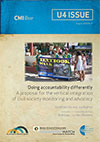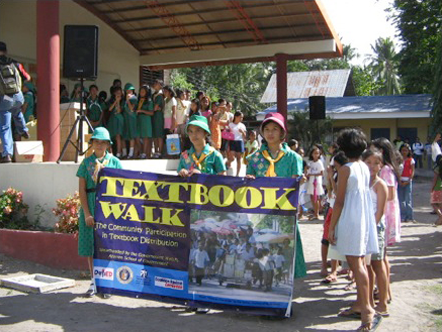
Doing Accountability Differently. A Proposal for the Vertical Integration of Civil Society Monitoring and Advocacy.
Date: August 2016
Authors: Jonathan Fox, Joy Aceron, Aránzazu Guillán Montero
Publication type: Working Paper
Published by: U4, ARC
Civil society accountability initiatives that take into account power structures at multiple levels can produce more lasting institutional change, compared to locally-bounded initiatives that address the symptoms rather than the underlying causes of accountability failures. Vertically integrated civil society policy monitoring and advocacy initiatives involve inter-relationships between local, subnational, national and international actors. The research combines two complementary perspectives: a scholars overview of this strategic approach, including five propositions on vertical integration, in dialogue with a practitioners in-depth analysis of Textbook Count in the Philippines, a civil society coalition which, in partnership with government reformers, provided independent monitoring of an entire supply chain in the education sector. The analysis addresses the implications of vertical integration for civil society coalition dynamics, and the distinction between independent policy monitoring and advocacy. The conclusions suggest that better donor coordination of civil society support can create opportunities for more integrated initiatives, taking advantage of critical entry points provided by sector-specific approaches. Facilitating dialogue between different actors and supporting longer implementation strategies can also advance integrated monitoring and advocacy.
 Philippines Textbook Walk In the Textbook Walk program, Girl Scouts took part in the distribution of textbooks from the district office of the Department of Education to their school in Dauin, Negros Oriental, Philippines. Credit: Gladys Selosa
Philippines Textbook Walk In the Textbook Walk program, Girl Scouts took part in the distribution of textbooks from the district office of the Department of Education to their school in Dauin, Negros Oriental, Philippines. Credit: Gladys Selosa
Jonathan Fox Jonathan Fox is a professor in the School of International Service at American University. He studies the relationships between accountability, transparency and citizen participation. He directs the new AU Accountability Research Center, an action-research incubator. His most recent publications include articles in World Development and the IDS Bulletin, and reports published by Making All Voices Count, U4: Anti-Corruption Resource Center and the Transparency and Accountability Initiative. His books include Accountability Politics: Power and Voice in Rural Mexico (Oxford 2007) and Mexico’s Right-to-Know Reforms: Civil Society Perspectives (co-editor, Fundar/Wilson Center 2007). He was a founding member of the International Expert Panel of the Independent Reporting Mechanism of the Open Government Partnership and currently serves on the boards of directors of Fundar (Mexico) and the Bank Information Center (DC). For online publications, see http://jonathan-fox.org/. Joy Aceron Joy Aceron is Convenor-Director of Government Watch (G-Watch), an action research organization working on accountability and citizen empowerment in the Philippines. Concurrently, she is a Research Fellow at Accountability Research Center (ARC) based in School of International Service (SIS) of American University, Washington D.C. A graduate of the University of the Philippines-Diliman with bachelor’s degree in political science and master’s degree in public administration, she has 15 years’ experience in citizen monitoring, citizenship education and civil society government engagement and has been invited to over 20 countries to speak in international conferences and to facilitate learning workshops. Joy has published works on political reform, civil society participation in governance and leadership, the most recent of which is a publication with Jonathan Fox on vertically-integrated citizen monitoring and advocacy campaigns. Formerly a program director and senior knowledge and practice leader at Ateneo School of Government for 10 years, Joy is at present a member of the Institute of Development Studies (IDS)-Making All Voices Count (MAVC)’s Research Outreach Team and the Philippine Researcher for Open Government Partnership (OGP)’s Independent Reporting Mechanism (IRM).
